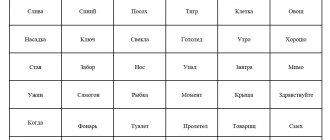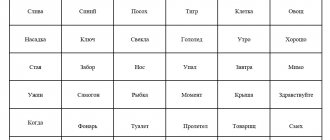What would you do if...
A game in which you need to answer questions correctly and clearly. Examples: What would you do if... there was a tornado near you? brother lost your house at cards? did you find yourself in a museum at night? threw a cake at the boss?
Logic chains
The players sit down at the table. The first one says 2 words - let them be “car” and “cabinet”. The second participant connects these words into a single sentence: “My husband secretly bought a car and hid the documents for it in a closet.” Then he says his word, for example, “handkerchief.” The third comes up with a continuation of the story, adding a new word to it: “If he had covered the documents for the car with a handkerchief, his wife would not have found them.” The duration of the game depends on the imagination of the children. You can make it more difficult by asking everyone to voice the entire story.
Representation in 3-D
This competition will bring a lot of fun and joyful emotions to both the spectators and the participants themselves. Teams of 4-5 people are formed from the participants. Each team chooses its own forfeit, which will indicate to them a certain situation that they must show in 3-D. For example, relaxing by the sea: someone shows seagulls with their hands and sounds them with cries of “my my my”, someone imitates a gentle sea breeze, someone sounds the splash of sea waves, and someone shows the bright glow from the sun. Situations in forfeits can be completely different, for example, a flight into space, a morning in the forest, and so on. Whose team shows the best 3-D performance will receive its prize.
Youth game “International tag”
The game has become very popular among young people. What's the point? One player flies into another's country without warning him. Having chosen the moment, he makes fun of the unsuspecting “victim”, photographs her reaction and immediately flies off to his home. Now you'll have to drive while greasy.
The game was invented by a group of students from different countries who were vacationing abroad together. Their game began on vacation and is still not finished. One participant took extreme measures: she attended the christening of a rival’s relative in the guise of an old gardener. The young man's relatives played along with her, and the girl managed to make him look bad. This was the beginning of a large-scale game that is gaining popularity around the world.
A reasonable alternation of intellectual and active games will provide you with excellent relaxation. If you are organizing an outdoor picnic, prepare props for competitions in advance. Well-chosen games promote team unity and improve mood.
Find the orange
The presenter announces the competition and its conditions: in front of each participant there are 3 boxes (which are not see-through and completely closed), in each box there is a hole for a hand, in one of the boxes an orange (apple) is hidden and in one of the boxes there are, for example, spiders or worms (but in fact there are no spiders). At the command “start”, each participant must stick his hand into all three boxes and find the orange faster than the rest. Some of the guests, and most likely all of them, will not immediately decide to stick their hand in, knowing that there are “unpleasant” creatures sitting in one of the boxes. But, nevertheless, whoever finds the orange first wins. And in the end, the guests themselves will guess, and the host will confirm that there were no worms or spiders. And the participant who can overcome his fears and find an orange faster than others will receive a prize.
Make up your own word
For this competition, the presenter must think through and choose interesting words. For example, in front of the guests there is an easel and the word - . u. nya The host explains that the guests must think carefully and pronounce the word that fits, that is, simply add letters instead of dots. Or, for example, you need to make up a word of 5 letters, which must contain the letters p, z, d, a. In this way, guests will cheer themselves up and become inspired. But the answers are quite simple. The first option is the kitchen, and the second option is the west.
Intellectual games for youth: with a brief description
- Association - participants sit at a table. The first one names two words, for example, garage and laptop. The second player begins to come up with a sentence, connecting these words: “The wife is tired of her husband constantly sitting at the laptop and the husband moved to live with him in the garage.” After this, the player says another word, for example, “mattress”. The third should continue the story by adding a sentence with a new word: “Sleeping on the garage floor is not as comfortable as sleeping on a mattress.” The game continues as long as there is enough imagination. You can complicate it by forcing everyone to repeat the story from the beginning.
- What would you do? – it is necessary to answer the questions correctly and clearly. Sample questions: what would you do if... you spilled tea on your boss? were you locked in a store overnight? Did a relative lose your salary gambling? Has there been a natural disaster?
- Guess the movie - players are given cards with a unique description of the movie. You need to guess the name. For example: “A disabled former soldier transforms into a blue body and gets rid of his disability. He gets into a relationship with a blue woman, and the man runs through strange forests.” (Avatar)
- Keeper of Secrets - the participant thinks of a popular phrase and names the number of words in this phrase. Players ask the keeper questions. The answer must contain a word from this phrase. Example: “Patience and work will grind everything down.” You can ask 4 questions. Question: “What did you have for lunch?” Answer: “Nothing, patience is my strong point.” Question: Do you like Dima Bilan's songs? Answer: “No, but it’s a lot of work to compose and perform a song.” Participants write down their answers and analyze what they hear for a while, then try to compose an encrypted phrase.
- I’ll take it with me – the participant writes down on paper or on his phone a rule that determines what things can be taken with him on a trip. Then he says “I’ll take with me...” and the name of the thing that does not violate the rule. The rest of the participants begin to ask if they can take this or that item. The winner will be the one who first guesses by what rule objects are determined.
Outdoor game for young people: with description
- Notice me - you need to play where there are a lot of trees (forest, park). One participant goes forward, the rest follow him, hiding behind bushes and trees. Periodically, the participant walking in front turns around and removes those he saw from the game. The winner is the one who gets to the participant first or is closer than the others.
- The floor is lava – the game can be played both during the meeting and while going to the store, etc. At any moment, any of the . The task of the rest is to lift their feet off the floor within a minute. You can sit on a bench, climb a tree, hang from a horizontal bar. Whoever did not manage to protect himself from the “lava” in the shortest possible time lost.
- Bottle bowling - you will need a ball and empty bottles that will act as pins. The rules of the game are the same as in regular bowling.
- Darts and Balloons – Blow up balloons and tape them to a tree or fence. You need to knock out as many balls as possible. You can write numbers on them with a marker so that each player marks a certain number.
- Jumanji - you will need a cardboard box from which you should make a cube, as in a regular board game. Use chalk to mark the field for the outdoor game. The rules of the game are the same as in a board game, but the cube is made of a cardboard box, and instead of figures, real people will walk in the squares. In the cells you can write down tasks that the participant must complete by standing on a certain cell.
Happy snake
Previously, the presenter writes down various parts of the body on pieces of paper (can be repeated). All the leaves are then moved into a hat or bag. The first players (their number is not limited) take turns drawing leaves. Their task is to touch each other with those parts of the body that are indicated on their leaves. Other participants join them in turn according to the same principle. The last player takes the last player’s hand and begins to lead the entire “snake” in a circle to the music. The snake must not be torn apart. The player continues until the integrity of the “snake” is broken.
mission Impossible
Several ropes are pulled in different directions and at different heights in the room. Two players are invited to take part in the competition. First, they are asked to study an unusual maze in order to memorize it, after which the Mission: Impossible participants are blindfolded. The catch is that after the players are blindfolded, all the ropes are removed. At the same time, the audience should “help” those performing a difficult task, shouting “higher”, “lower”, “bend down” and so on. Of course, there are no winners in this competition. Good mood and laughter win.
Popular games for young people: with a brief description
- Pickup - each person in the group selects a victim of the opposite sex from the crowd on the street. The goal is to get to know each other, surprise, force the person to help you or take the phone number of your interlocutor. With the help of charm you need to achieve your goal. The best pickup artist becomes the winner.
- Sox – you will need a small ball that can be easily held on the toe of your foot. The participants’ task is to throw the ball to each other; they can receive it with their feet or chest; they cannot drop the ball or touch it with their hands.
- Stand up straight - you need a bottle half filled with water. The goal of the players is to throw the bottle so that it turns over and lands flat on the ground.
- Hide and seek on a social network – one participant counts to ten. The rest hide and take selfies in the place where they hid. The hide-and-seek territory does not have to be huge. Photos must be posted on social networks to the participant who is looking for others. He, guided by photographs, searches for the desired area and participant.
Hear me
For this competition you need to prepare many, many small notes with different words, preferably long ones (one note - one word). All the guys sit at their desks, one brave participant comes to the board and waits until each of the other guys takes out his forfeit. Each fanta (note) contains a word. On the count of “one, two, three,” the guys each shout their word loudly and loudly in one voice. The task of the participant near the board is to make out as many words as possible among the “hype.” Next, the second participant comes to the board, the guys again take out forfeits with different words. The winner of the competition will be the participant who can understand more words in the “chorus” of classmates than the rest.
Competitions for Student's Day - fun and funny
Quick summary
The host of the holiday will prepare a short story or any excerpt from any work in advance. Each student participant receives a piece of paper and a pen and writes their notes. The presenter begins to dictate slowly, gaining momentum with each word, reaching the speed of light. Participants get confused and miss words. And which of the guys can hold out until the end and outline the text more accurately than the rest is recognized as the winner and receives a prize.
Gryz granite science
Students are divided into pairs, preferably a boy and a girl. A large apple is placed between the mouths of each pair. Whose couple eats the fruit more harmoniously and faster, that couple becomes the winner.
Happy ticket
For each of the guys, in turn, tickets are laid out on the table, among which are forfeit tickets with tasks, for example, to hang down like the Nightingale the Robber; dance hopak; show the most harmful teacher and so on, and only one ticket among all is a lucky one, in which some “good” condition is written, for example, everyone chipped in 10 rubles for this person for the session or you were lucky - you won a T-shirt (or other prize, which is prepared for the holiday). What the student pulled out is what he got: either he makes a forfeit or receives his prize on a lucky ticket.
Dorm
Two members are appointed as "dormitory commandants". A dormitory is a chair on which you need to seat as many people as possible. Although even any participant simply holding the chair with his palm, and not just sitting on it, is considered “settled”. The commandant whose “dormitory” accommodates the most residents wins.
Record book
Participants (“students”) are given a piece of paper. Each of them must collect the signatures of ten “teachers” on this piece of paper within a certain time. The teacher can be any other participant and even another “student”. Signatures are taken into account only in the form “item - assessment - signature”. The one who does this first receives a “scholarship” from the presenter, that is, a prize in the form of candy or an apple.
Student handwriting
The guys are divided into 2 teams and in each team they choose one participant who will have to recognize the handwriting of the rest of the members of their team. Everyone takes turns writing on a piece of paper a sentence or a simple phrase: Happy Student's Day! , and the selected participant must understand whose handwriting is where. If the guys recognize the handwriting of all the guys, they will receive prizes, and if not, the guys will fulfill the wish of the one they didn’t guess.
Pull the ticket
Comic tasks are written on pieces of paper. For example, crow ten times, dance a national dance, sing a song in a bass voice, etc. Participants in the competition are asked to draw a ticket with a task. But it's not that simple. A strict “commission” asks additional questions, asks to repeat this or that action at a slow or accelerated pace, to accompany some action with sounds, and sounds with movements. And only after that he gives his assessment.
Granite Science
Participants in the competition are given a chocolate bar. After which the presenter announces that they have in their hands the “granite of science”, which they need to start gnawing on command. After the winner has been determined, who was the first to eat chocolate, the presenter explains that this was only the first course and gives everyone who moved to the second course a banana. In the third course, the participants suck a lollipop, in the fourth they eat an apple, and in the fifth they drink Borjomi . The winner is the student who completes the fifth year the fastest.
Faculty to faculty
This is an interesting and fun “who will win” style game between faculties. Faculties sit in groups and “roll a barrel” at each other in a circle, for example, the faculty of lawyers tells the accountants: “we will put you in jail,” and the accountants tell the journalists: “we will reveal your double-entry bookkeeping,” and the journalists tell the engineers: “we will expose your great secret and publish our journalistic investigation” and so on in a circle. Whichever student runs out of arguments is eliminated from the game, and the most persistent faculty is the winner.
How about clogs?
Students are cheerful and interesting people, and they often take each other on board, as they say. They select male participants and seat them on chairs. The presenter asks the question: “Are you weak?” and then a pause, he pulls out a machine from behind his back. Is it bad for male students to shave one leg, say, for a bottle of champagne or some other tasty prize? Anyone who agrees begins the process at the “start” command. We award a prize to the most dexterous master who can shave his leg efficiently.
Frankenstein is resting
Teams of 3 participants participate. So, the first three teams come to the board. In each team, one of the participants is blindfolded. For each team, printed (drawn) pictures of various human organs are attached to the board using tape (the pictures are not labeled), for example, the heart, bronchi, liver, kidneys, stomach, and so on. The game goes as follows: the first participant takes off one picture (one organ), names what it is and gives it to the second participant with his eyes closed, and the second participant by touch attaches the picture to the third participant - in the place where, according to his assumption, this organ should be located . The team that completes the task better (correctly and cheerfully) wins.
Group games for young people: a list with a brief description
- Truth or Dare - the presenter names a person in turn, and he must choose whether to tell the truth about himself or complete the task.
- The crocodile participant must show the others the word written on the task card without saying a word.
- Forfeits - each participant puts an item that belongs to him in the box. The presenter blindly selects an item and gives the task to the participant to whom that item belongs.
- Who are you? – participants are given a sticker on their forehead with a character written on it. You need to determine who you are by asking your opponents questions that can be answered yes or no.
- New outfit – You need to put various clothes in a dark bag: bras, clown nose, children's tights, etc. The packet is passed around in a circle until the leader says: “Stop!” The one on whom the package landed takes out the first thing he comes across and must put it on himself.
- Twister - using a tape measure and a canvas with colored circles, participants must place their arms and legs on certain circles without falling.
- Confusion – relevant when there are equal numbers of men and women. Women and men are given a wish for an animal. On command, all women must make the sounds of their animal, and the men must find their mate in this commotion.











